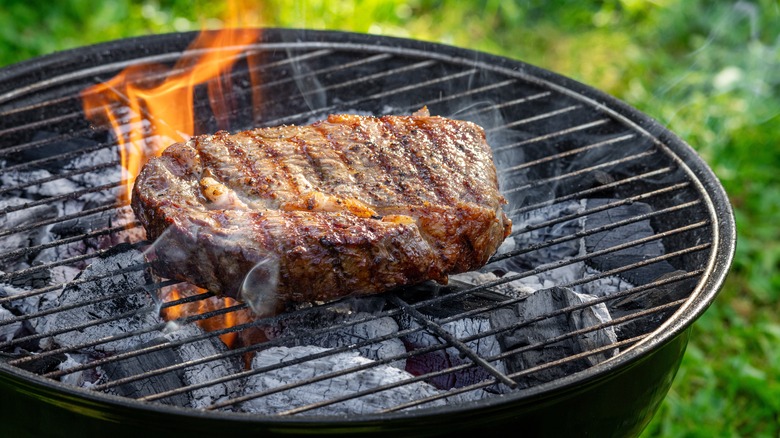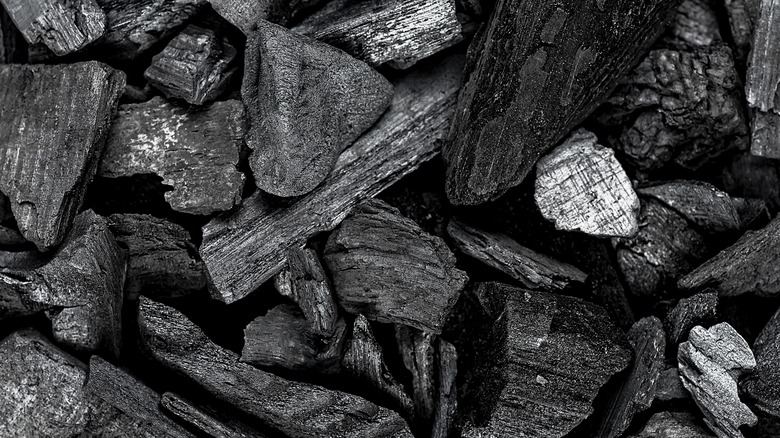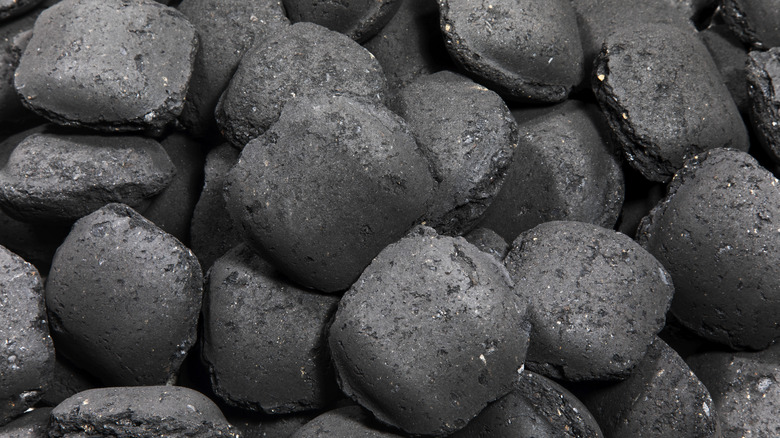The Difference Between Lump Charcoal And Charcoal Briquettes
I love grilling and have had the privilege of watching my dad grill ever since I was young. It always seemed like such serious business when it came to getting it started up, but I never understood why. In my mind, just grab a bag of charcoal and let's go. But I've seen him stand there frustrated about how he was going to have to get charcoal briquettes if they didn't have his favorite brand of lump charcoal available. I get it now. Having my own family and hosting BBQs on the weekends with my husband has landed me in the aisle having the same convo in my head.
If you're serious about grilling, you've 100% come across lump charcoal and charcoal briquettes. Whether you've taken the time to figure out the difference apart from the shape is another story. If the purpose is to grill food and both do that, what's the big deal? Well, it does matter. Put simply, one fares better than the other depending on what you're cooking.
Both are made from carbonized wood, but how they're processed and how they perform on the grill varies a bit. Choosing the wrong one might not ruin your cookout, but it could make your life harder than it needs to be, especially if you're trying to control heat or get consistent cook times.
Lump charcoal is often hailed as the more "natural" option since it's just chunks of hardwood burned down to carbon without any additives. Briquettes are a uniform product made by compressing a mixture of ingredients like sawdust, coal dust, and fillers like starch and borax (sometimes). Lump is better for cooking food quickly while briquettes are the go-to for cooking meats that need a longer time on the grill. Briquettes are generally cheaper and easier to work with than lump charcoal, but many say lump has the flavor advantage over briquettes. Hmmm, decisions, decisions.
Why lump charcoal is better when you want real heat control
Lump charcoal is the go-to for grilling purists who say briquettes contain too many chemicals which produce a lot of dirty smoke and ashes. If you're cooking on a ceramic grill like a Big Green Egg or just need to dial up or down the heat quickly, lump charcoal is the better option because it lights faster, gets hotter, and reacts more nimbly to adjustments in airflow.
It also produces very little ash, which means less mess and better circulation during the cooking process. That's important for both flavor and safety, especially when grilling high-fat meats that drip and sizzle a lot. The downside is that lump charcoal can be unpredictable when burning because of its irregular. size. In other words, heat output isn't always even and the burn time tends to be shorter.
These elements make it less ideal for long, slow cooks unless you're prepared to refuel mid-session. If you were going to transform your grill into a smoker, you probably wouldn't choose lump charcoal as the fuel even if it does give you a more intense, smoky flavor. On the other hand, if you're grilling something fast and flavorful like steaks, chops, or burgers lump gives you more firepower with fewer additives getting in the way.
When briquettes make grilling easier
If I'm being honest, briquettes aren't all that bad despite the chemicals. They aren't my choice, but I can understand why people use them. They were designed to solve a practical problem, effectively creating a fuel source that lights reliably and burns consistently. In the instance where you're smoking ribs, for example, you might choose briquettes if you don't really know how to work with lump charcoal. They'll give you steady heat over a long period of time without as much babysitting, perfect for kettle grills and standard backyard cookouts.
The consistency in shape and size means briquettes are easier to stack, easier to light in a chimney, and easier to control in setups like two-zone grilling. That kind of control is hard to beat, and some brands (like Better Wood Products) make briquettes that skip the fillers to use only compressed hardwood, giving you the best of both worlds in relation to predictable heat and a cleaner burn.
If you're grilling on a kamado or ceramic grill, chemical-free briquettes are safer and won't leave residue which will ruin your grill over time. Of course, choose whichever product makes the most sense for you. I'm trying to help people bring those charcoal grills out of hibernation and put them to good use as summer approaches.


